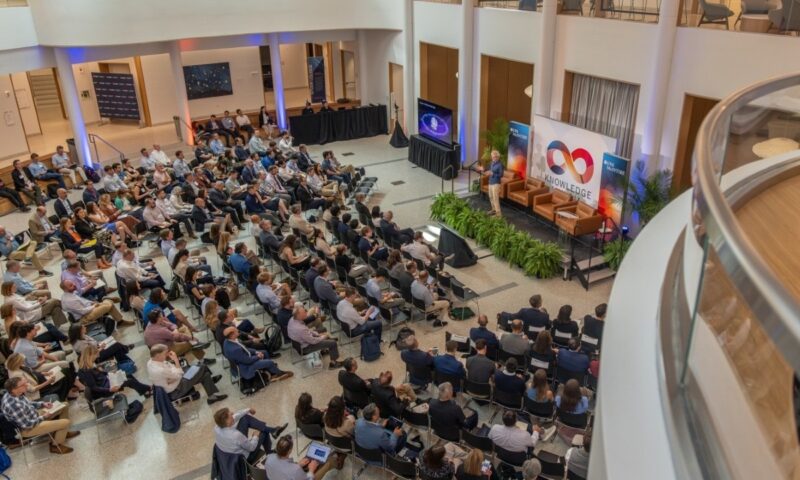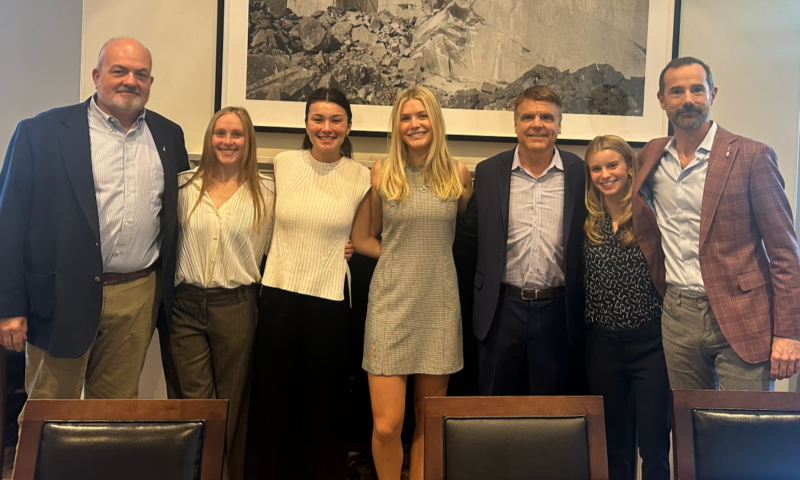
Joanna Bergeron and Ben Harden
Trending topics like AI, automation, and customer analytics aren’t just changing the nature of business, they’re creating a wealth of new opportunities.
Providing real-world insights on these subjects and vital information about stimulating careers in data, industry experts met with students at the McIntire School of Commerce’s Rouss & Robertson Halls for the fifth annual Business Analytics Colloquium Friday, Sept. 7. Hosted by the Center for Business Analytics (CBA), the event welcomed corporate partners from key players in the field, such as Joanna Bergeron (A&S ’98, M.S. in MIT ’03) and Ben Harden from technology and management consulting firm CapTech.
Bergeron, Principal and Chief Talent Officer, and Harden, a Principal and manager of CapTech’s Data & Analytics practice, both have a history of taking a collaborative approach with clients to connect their business goals to technology. Based in Richmond, VA, Bergeron brings nearly two decades of experience in IT management consulting and has developed the firm’s “people strategy,” which aligns client needs with top industry talent. Harden also speaks from extensive consulting experience, having collaborated on business intelligence projects for Fortune 500 organizations and managed data-related projects in the healthcare, financial services, telecommunications, and governmental sectors.
As CapTech tailors custom solutions for its range of clients, the firm has launched its own inventive method for inviting new ideas and game-changing approaches through its quarterly Innovation Build Challenges. Open to employees at every level of the organization, anyone can get involved by creating proof-of-concepts to present to leadership.
Highlighting emerging technologies like machine learning, augmented reality, and natural language processing, the company has been informally conducting the challenges for many years, and formalized it in late 2016. Past winners at the firm have included a team that built an application for querying data by voice in real time and one that designed a mobile app that mines Amazon reviews to give sentiment analysis of a product.
“The most surprising thing that we have found in these challenges is the number of unique ideas the teams come up with that use emerging technologies,” Harden says.
Bergeron says the teams’ efforts offer benefits to customers and employees. “It’s exciting to then take the work that the teams have done and to demo the application to prospective clients,” she says. “It’s also a great way for our consultants to get exposure to new technologies while also growing our business.”
As a result of CapTech’s in-house challenges, Bergeron and Harden say that they have learned a great deal about these innovative solutions. They have also come to understand that the interactions of these technologies will make the greatest impact. Here, Bergeron and Harden provide three insights about the transformative potential that will continue to affect multiple industries:
1. Value comes from the synergy of technologies.
The convergence of technologies is where organizations are realizing the most value. Today, the intersection of tech (e.g., cloud, AI, data, and machine learning) is creating opportunities that previously would have been impossible. “On their own, any one of these can be a powerful tool, but together is where you can realize the most value. Without this combination, things like facial recognition or self-driving cars would remain fantasy,” Bergeron says.
2. Data is the connector.
Without data to feed into natural language processing, AI, or machine learning, these technologies are limited. Having the engineering in place to collect data and move that data into a place where you can use it in a timely fashion is what lets these technologies work their magic. “If a self-driving car knows what a deer looks like only after I’ve hit it, that’s not very helpful,” says Harden. “Data engineering is the thing that brings all of it together.”
3. Don’t fear increased automation.
Advances in technology will beget more advances. “Ultimately, we’re going to have the ability to train machines to automate things that in the past we haven’t been able to. It may sound frightening, but it’s really not,” Bergeron insists.
Harden agrees: “It’s actually a great opportunity for us because that frees up people to do more of the creative, thoughtful work while machines are doing all of the repetitive activity.”


